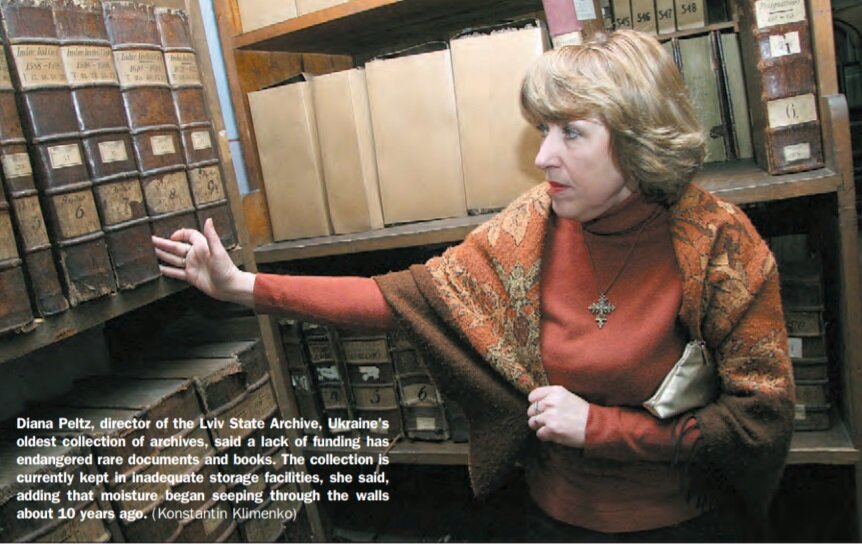The Lviv State Archive contains documents dating back to the 12th century.
Ukraine’s oldest collection of archives has finally received some of the attention it desperately needs, with the United States Agency for International Development (USAID) funding the lion’s share of a $105,000 preservation project.
But project implementers – the US-Ukraine Foundation in cooperation with the R’fa’aye-nu Society – say more assistance is needed to ensure the archive’s future and availability to international scholars.
The Lviv State Archive contains documents dating back to the 12th century. The archive, located on the grounds of the Bernardynskiy Monastery in the western Ukrainian city’s center, houses over a million documents, including decrees, diplomas, medieval prints, maps, blueprints and dignitaries’ personal documents on 7.5 miles of shelves. But the current premises expose the fragile documents to humidity, mold, sunlight and insects.
Many records are originals from foreign sources, written in languages as diverse as Turkish, Arabic, German, French and Polish, in addition to Ukrainian.
The preservation project was launched in 2005 by the US-Ukraine Foundation, a US-based NGO that promotes democratic development, free-market reforms and human rights in Ukraine, in cooperation with the the R’fa’aye-nu Society, which has sought to retrieve and restore Jewish manuscripts in Eastern Europe with the help of Christian churches.
The completion of the so-called Lviv Archives Preservation Project is scheduled for this summer.
So far, contractors have repaired the premises’ drainage and wiring systems. Tasks such as fixing the roof, chemically treating the documents, and installing air conditioning and a fire alarm system still need to be carried out.
“This project is vital to preserving not only Ukrainian history and culture, but the histories and cultures of Belarus, the Vatican, Italy, Lithuania, Germany, Poland, Hungary, Turkey, and France that are documented in the Lviv Archives.
Comprehensively catalogued in the Archives is also the history of the Jewish community in western Ukraine,” said Foundation Vice President John A. Kun.

Diana Peltz, director of the Lviv State Archive, Ukraine’s oldest collection of archives, said a lack of funding has endangered rare documents and books. The collection is currently kept in inadequate storage facilities, she said, adding that moisture began seeping through the walls about 10 years ago. (Konstantin Klimenko)
The Foundation also hopes to use available funding to train staff in modern preservation techniques and bring in Western experts to share best practices in archival technologies.
On its website, the Foundation emphasizes that it works directly with contractors: “No funds go directly to Ukraine’s Central State Historical Archives in Lviv.”
The most invaluable part of the archive is the so-called Department of Ancient Acts, which includes records written on elm from 1124. They were found near Moscow and trace the genealogy of several notable Ukrainian, Polish and Austrian families.
“The Lviv archive is the most ancient in Ukraine – even older than the Kyiv State Archive, where the oldest documents date back only to the 17th century,” said Olga Ginsberg, the head of the State Archives Committee.
“Moisture began seeping through walls about 10 years ago. Practically nothing has been done because we simply have not received any funds from either state or private sources,” archive director Diana Peltz explained.
The current $105,000 project was initiated by Mira Brytchko, the founder of the R’fa’aye-nu Society that initially approached the Foundation with the idea to apply for USAID funding.
“We are currently restoring the documents in poorest condition and have started to make facsimiles just in case. In the future we plan to digitize the entire archive, which will prolong the life of the documents and make them readily accessible to the public,” said Peltz.
“To do this, the archive needs to buy expensive equipment, including microfilm machines, printers, scanners, modems, etc., which we currently can’t afford,” she added.
The Lviv State Archive is starting a joint project with the Lviv Center of City History, whereby the Center would create digital copies of the most valuable collections using its own equipment.
Peltz said every year the archive is visited by hundreds of professional researchers and tourists.
“More and more people interested in their genealogy are showing up. They come from Poland, Germany, Austria, America and other countries to find out about their Ukrainian roots. We do provide some research services in this field, which allows the archive to earn some money and show its usefulness to many people at the same time,” said Peltz.
